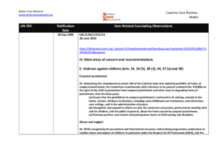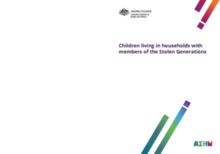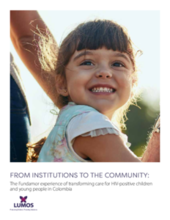Displaying 441 - 450 of 1510
This country care review includes the care related Concluding Observations adopted by the Committee on the Rights of the Child and the Committee on the Rights of Persons with Disabilities.
This study explored the social images of families of children and youths in residential care in a sample of 176 participants with and without professional contact with this population.
The aim of the current study is to identify different subgroups of adolescents placed in Residential Care (RC) on the basis of different dynamic factors and analyze their relation with antisocial behavior and family violence.
This report presents analyses of selected outcomes for Aboriginal and Torres Strait Islander children who live in households with members of the Stolen Generations.
This report documents Fundamor's process of closing its institution in Colombia and moving children to family-based care, drawing out successes and challenges.
Este informe documenta el proceso de la organización Fundamor a cerrar su internado y, con el apoyo de Lumos, reubicar a los niños y niñas internos en nuevas modalidades de atención familiar.
This study aimed at investigating specifically whether institutionalization impacts negatively children’s psychological adjustment defined in terms of externalizing behavior, internalizing behavior and self-esteem and whether having living parents has additional influence. Ninety-five institutionalized and 82 not institutionalized children in Rwanda, aged 9 to 16, participated in the study.
The goal of this research was to challenge or validate the assumptions that underpin existing impact and change focused solutions; to combat the complete dearth of data and lack of meaningful information available in the sector about the longer term effects of institutional care on children in India; and to enable programmes both within and outside of Make A Difference to be designed on the back of benchmarked and trackable outcomes.
This study analyzed how the implementation of the strategy of extending learning time in a group of adolescents living in residential care contributed to promoting their scientific vocations and increasing their academic expectations and their knowledge of these disciplines.
“Current Aftercare Practices” (CAP) is a documentation exercise designed to look at the support and services received by CLs from the objective lens of an ‘Aftercare Quality Index’(AQI), calculated using the scores within 8 domains. This report covers a total of 98 young adults from Rajasthan, comprising of 40 males and 58 females CLs, from both Government and NGO-run Child Care Institutions (CCIs) and 17 youth who, as children, availed the benefits under the Palanhar scheme of the Rajasthan Government.







